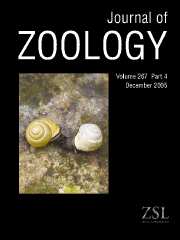Crossref Citations
This article has been cited by the following publications. This list is generated based on data provided by
Crossref.
Cantú‐Salazar, Lisette
Hidalgo‐Mihart, Mircea G.
López‐González, Carlos A.
and
González‐Romero, Alberto
2009.
Dry Season Den Use by Pygmy Spotted Skunk (Spilogale pygmaea) in a Tropical Deciduous Forest of Mexico.
Biotropica,
Vol. 41,
Issue. 3,
p.
347.
Stoner, Kathryn E.
and
Timm, Robert M.
2011.
Seasonally Dry Tropical Forests.
p.
85.
Zhou, You-Bing
Newman, Chris
Buesching, Christina D.
Zalewski, Andrzej
Kaneko, Yayoi
Macdonald, David W.
and
Xie, Zong-Qiang
2011.
Diet of an opportunistically frugivorous carnivore,Martes flavigula, in subtropical forest.
Journal of Mammalogy,
Vol. 92,
Issue. 3,
p.
611.
KLARE, Unn
KAMLER, Jan F.
and
MACDONALD, David W.
2011.
A comparison and critique of different scat-analysis methods for determining carnivore diet.
Mammal Review,
Vol. 41,
Issue. 4,
p.
294.
Thorne, Emily D.
Waggy, Charles
Jachowski, David S.
Kelly, Marcella J.
and
Ford, W. Mark
2017.
Winter habitat associations of eastern spotted skunks in Virginia.
The Journal of Wildlife Management,
Vol. 81,
Issue. 6,
p.
1042.
Wong, Seth Timothy
Belant, Jerrold L.
Sollmann, Rahel
Mohamed, Azlan
Niedballa, Jürgen
Mathai, John
Meijaard, Erik
Street, Garrett M.
Kissing, Johnny
Mannan, Sam
and
Wilting, Andreas
2018.
Habitat associations of the Sunda stink-badger Mydaus javanensis in three forest reserves in Sabah, Malaysian Borneo.
Mammalian Biology,
Vol. 88,
Issue. ,
p.
75.
Farías-González, Verónica
and
Vega-Flores, Cristina N.
2019.
Spotted skunks (Spilogale angustifrons) photo-captured following gray foxes (Urocyon cinereoargenteus) in tropical dry forest in central Mexico.
Journal of Arid Environments,
Vol. 160,
Issue. ,
p.
25.
Alba Preciado, María Azucena
and
Dueñas Romero, José Jesús
2020.
<B>Registro de zorrillo pigmeo (</B><I>Spilogale pygmaea</I><B>) en Compostela, Nayarit, México</B>.
Revista Mexicana de Mastozoología (Nueva Epoca),
Vol. 10,
Issue. 2,
p.
53.
Contreras-Moreno, Fernando
Simá-Pantí, David E
Cruz-Romo, Lizardo
Petrone, Sandra
Méndez-Saint, Gabriela
Méndez-Tun, José
Jesús-Espinosa, Daniel
Cruz-Molina, Ismael
Coutiño-Cal y Mayor, Carlos
and
Duque, Victor
2022.
Registros destacados de Spilogale angustifrons en la Reserva de la Biosfera Calakmul.
Revista Colombiana de Ciencia Animal - RECIA,
Vol. 14,
Issue. 1,
p.
e913.
Hernández-Sánchez, Alejandro
Santos-Moreno, Antonio
and
Pauli, Jonathan
2022.
Drivers of activity patterns of two sympatric skunks (Carnivora: Mephitidae).
Journal of Mammalogy,
Vol. 103,
Issue. 5,
p.
1030.
Tosa, Marie I.
Lesmeister, Damon B.
Allen, Jennifer M.
and
Levi, Taal
2023.
Multi‐locus DNA metabarcoding reveals seasonality of foraging ecology of western spotted skunks in the Pacific Northwest.
Ecosphere,
Vol. 14,
Issue. 1,
Pozos-López, Luis Ángel
González-Ruiz, Noé
and
Ramírez-Pulido, José
2024.
Unusual importance of insectivory in the diet of the Neotropical otter, Lontra annectens (Major, 1897) (Mammalia, Carnivora).
Neotropical Biology and Conservation,
Vol. 19,
Issue. 4,
p.
505.
Hernández-Sánchez, Alejandro
Santos-Moreno, Antonio
and
Nelli, Luca
2024.
Availability of alternative prey rather than intraguild interactions determines the local abundance of two understudied and threatened small carnivore species.
PLOS ONE,
Vol. 19,
Issue. 11,
p.
e0310021.
Harris, Stephen N.
Flaherty, Elizabeth A.
Doonan, Terry J.
Hewett Ragheb, Erin L.
and
Jachowski, David S.
2025.
Diet of the Florida spotted skunk (Spilogale putorius ambarvalis) in a dry prairie ecosystem.
Mammalian Biology,
Vol. 105,
Issue. 3,
p.
329.

